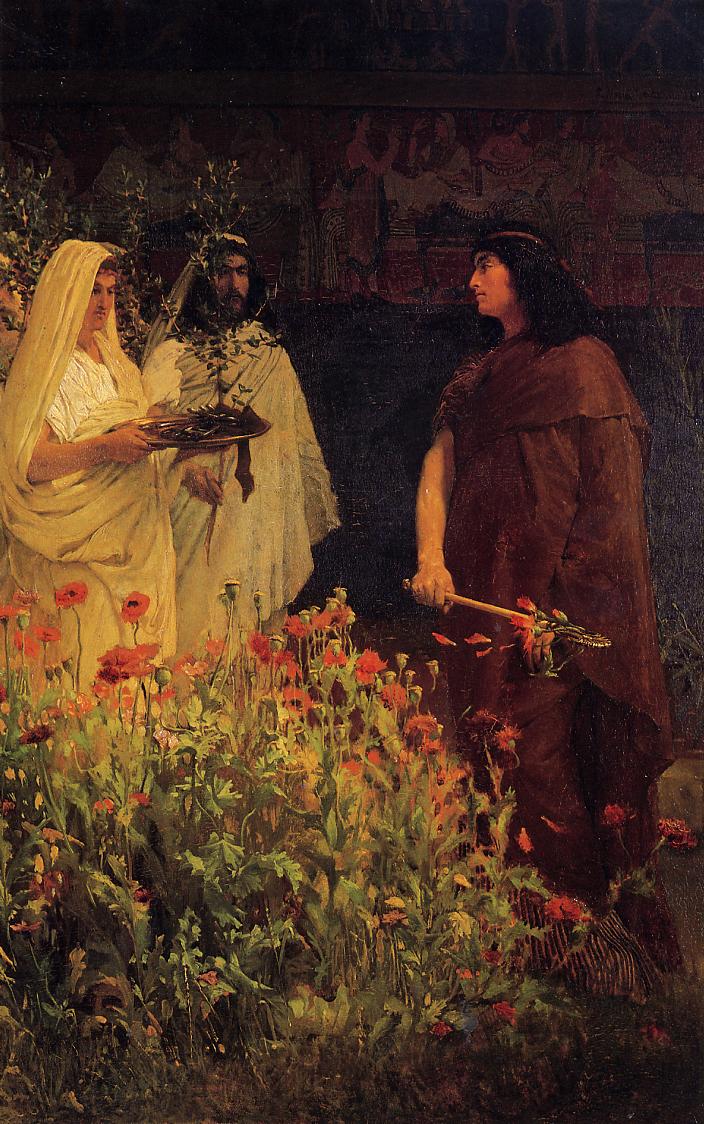In the wake of I Ching's pronouncement, I am inclined to think that Putin now represents an aging king who faces or is hung up on the issue of rejuvenation (when, ironically, Novorossiya has that right in its name). When men are faced with that challenge, the pull toward some folly or even worse dramatically increases. So I would be looking first among Greek aging power figures. In this connection, one problem emerges immediately.
With Putin and systems structured in similar ways (in difference to Lenin, Stalin was guilty of this too), no other potential leaders are let to grow past the one, as a result of which all the other leaders are, figuratively speaking, one or two heads shorter, and thus other leaders are at best just "leaders" in quotation marks and not true leaders. This problem does not arise in systems where figureheads are put up to the front (Obama's case). The real leaders are safe in the shadow. This problem has even its technical name: "Tall Poppy Syndrome," and its technology and origin goes back to the beginning of Western politics in ancient Greece:
[Periander] had sent a herald to Thrasybulus and inquired in what way he would best and most safely govern his city. Thrasybulus led the man who had come from Periander outside the town, and entered into a sown field. As he walked through the wheat, continually asking why the messenger had come to him from Cypselus, he kept cutting off all the tallest ears of wheat which he could see, and throwing them away, until he had destroyed the best and richest part of the crop. Then, after passing through the place and speaking no word of counsel, he sent the herald away. When the herald returned to Cypselus, Periander desired to hear what counsel he brought, but the man said that Thrasybulus had given him none. The herald added that it was a strange man to whom he had been sent, a madman and a destroyer of his own possessions, telling Periander what he had seen Thrasybulus do. Periander, however, understood what had been done, and perceived that Thrasybulus had counselled him to slay those of his townsmen who were outstanding in influence or ability; with that he began to deal with his citizens in an evil manner. [Herodotus' The Histories (Book 5, 92f), Aristotle's Politics (1284a), and Livy's History of Rome, Book I. Herodotus, The Histories, Book 5, 92-f]
Aristotle uses Herodotus' story in his Politics, (1284a) referring to Thrasybulus' advice to Periander to "take off the tallest stalks, hinting thereby, that it was necessary to make away with the eminent citizens."
The specific reference to poppies occurs in Livy's account of the tyrannical Roman King, Tarquin the Proud. He is said to have received a messenger from his son Sextus Tarquinius asking what he should do next in Gabii, since he had become all-powerful there. Rather than answering the messenger verbally, Tarquin went into his garden, took a stick, and symbolically swept it across his garden, thus cutting off the heads of the tallest poppies that were growing there. The messenger, tired of waiting for an answer, returned to Gabii and told Sextus what he had seen. Sextus realised that his father wished him to put to death all of the most eminent people of Gabii, which he then did."
That's why, for the Kremlin, besides trying to prop the legitimacy of the Poroshenko Nazi-oligarchic regime, its other urgent task was to recall Strelkov, a hero of our time, and make sure that he does not return and grow even higher. That's also why, if we look around Putin, we see people like Surkov, Medvedev, or Medvedchuk, with the latter two deserving to be called in conformity with the name of the last one "bears, but little ones."
Hopefully, Putin the aging oil and gas monarch, is not Medea's father .... and Alina Kabaeva is not Medea She did come very close to set fire to the cauldron at the Olympic Games in Sochi, though, just when the US was busy pulling off the Maidan coup in Kiev--just over 400 miles from Moscow: "Rumors that Kabaeva might light the cauldron grew so loud this week that Putin addressed the topic, calling it a “red herring” and insisting he would play no part in naming the torchbearers. [In the end], Kabaeva didn’t get the honor of lighting the cauldron ..." Kabaeva merely brought the Promethean light unto the Stadium and their handed it over to the last pair of the torchbearers.



No comments:
Post a Comment